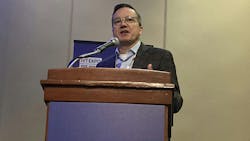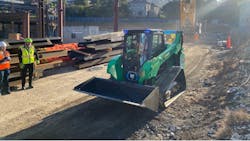Overcome Misperceptions of Electric Vehicles: Honeyman
Equipment buyers are not buying electric machines because they’re sustainable, says Joel Honeyman, VP global innovation for Doosan Bobcat. They are buying technology that produces a result that benefits their business.
Honeyman, speaking at the recent iVT Expo in Rosemont, Illinois, told engineers that the industry’s challenge lies not in the technologies of electrification, but in the perceptions of that technology.
“We face an uphill challenge,” Honeyman said. “[Critics] have a perception. What about those that have the reality of electrification?”
Honeyman suggests that experiencing the technology proves to end users that the technology delivers productivity, uptime, and safety.
“When we go back four to six years ago, [sustainability] was the race everyone was on,” Honeyman said. “We [Doosan Bobcat] wanted to look at it as electrification is far more than just those environmental benefits. We have to provide something more to the customer.
“We said we’re going to produce a work machine that is more powerful and productive and fulfills the sustainability needs. That’s the important word there: ‘and’ not ‘or.’
Honeyman cited two examples of how its T7X electric skid steer has been accepted by Bobcat customers.
How Bobcat is developing technology
- Investments in tech software company
- RogueX compact track loader teases autonomy
- S7X electric skid steer loader
- Bobcat partners with Turner, Sunbelt Rentals
- A look at the S7X electric skid steer by Electronic Design, an Endeavor Business Media sibling brand.
- Q&A with Joel Honeyman, by Power & Motion, an Endeavor Business Media sibling brand.
He said the use of electric actuators rather than hydraulics provides design efficiencies. The bucket, for example, can be automatically leveled as it moves up or down.
“On a diesel hydraulic machine, that’s a block and about eight hoses and 12 more leak points,” Honeyman said. “On this [electric] vehicle, it’s software; it’s lines of code.”
He then debunked the myth of runtime among critics. Honeyman said the average usage per day for an average Bobcat loader in North America is about three hours. One-third of that is idle time, he said, so the actual runtime is about two hours a day. The Bobcat T7X has four hours of runtime.
“An electric vehicle has no idle,” said Honeyman. “You’re only consuming energy when you’re moving the joysticks. Will some customers use it more a day? Absolutely. But for the vast majority of customers, four hours of runtime is more than enough for a full workday.
“Once you talk to people and talk through it, it makes a lot of sense to them,” he said. “Some of the early customers we had, instead of charging every night, they were charging machines every two or three days.”
Honeyman said Doosan Bobcat’s work on electrification occurs alongside its work on autonomy and connectivity.
“The magic is when all three are combined,” he said. “You can see how a new solution will come together, rather than in a silo, but the big advantages come in when you can bring those things together.”
How to drive acceptance of EV technology
Honeyman left attendees with a challenge for the developers of electric vehicle technology: Is it technology for the sake of technology, or does it solve a real customer problem? He offered four ways to help make electric vehicles more acceptable to equipment buyers.
- “Our industry needs to find value propositions of EV beyond sustainability.”
- Solve faster charging. “The day that we can charge a car or a vehicle in the same amount of time it took to fill up with gas or diesel fuel, the world will change.
- Components of EV technology can be applied on internal combustion vehicles.
- “We can’t force new technology—let customers experience it.”
About the Author
Rod Sutton
Sutton served as the editorial lead of Construction Equipment from 2001 through 2025.

